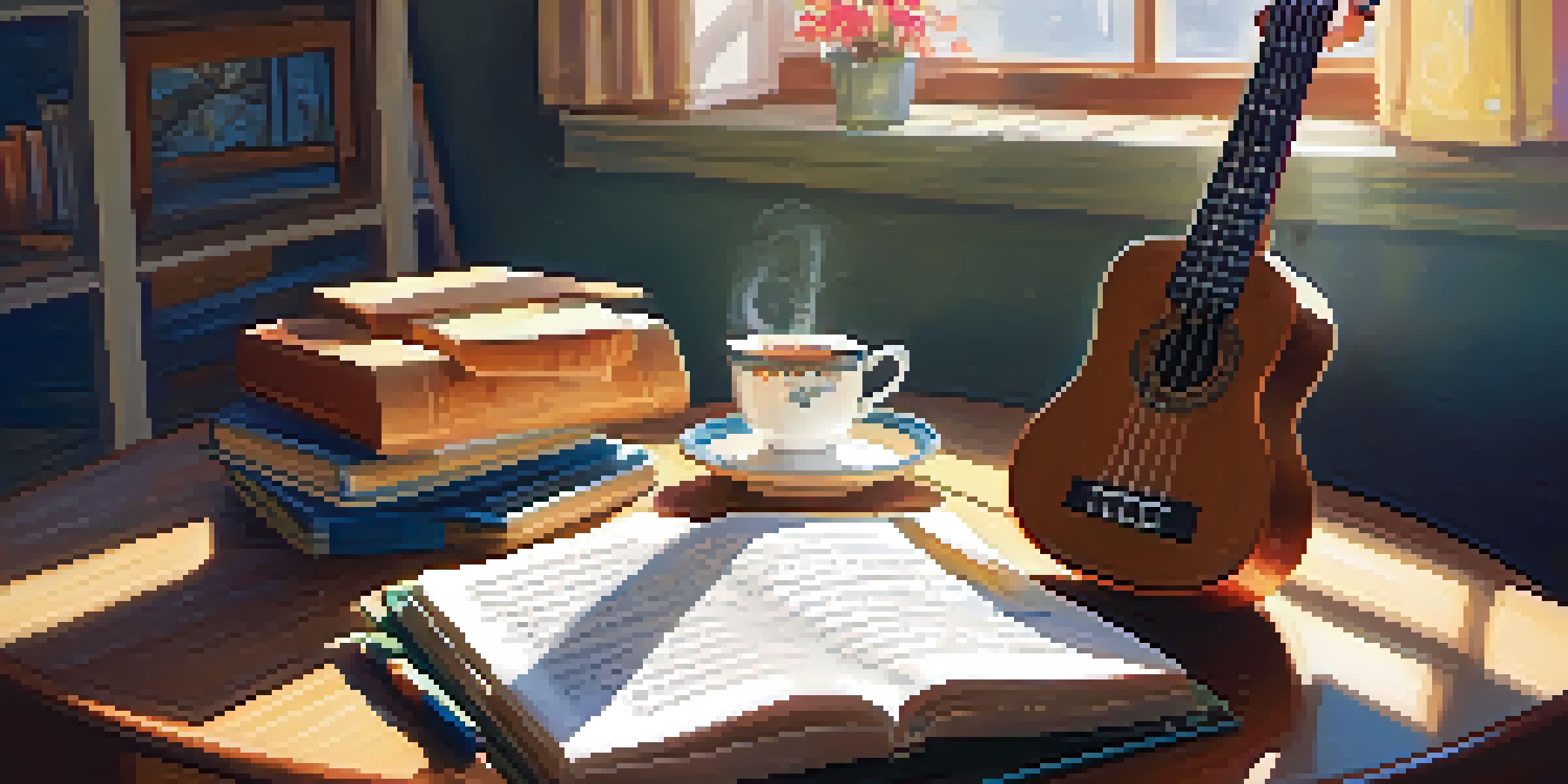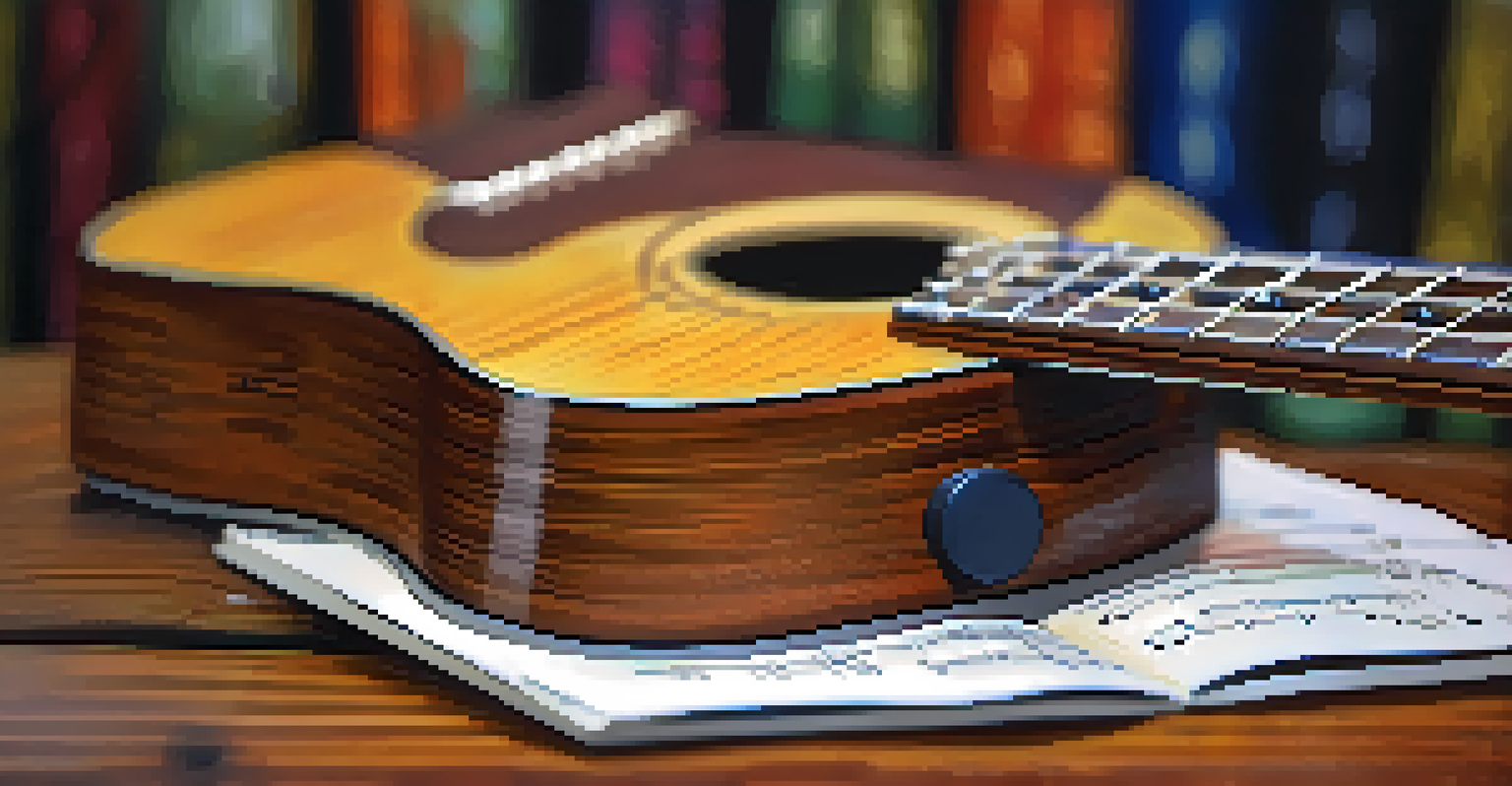Using Ukulele Chords for Songwriting Across Genres

The Versatility of Ukulele in Songwriting
The ukulele is a surprisingly versatile instrument, suitable for various music genres. Its light, cheerful sound can elevate a simple melody, making it an excellent tool for songwriting. Whether you’re crafting a heartfelt ballad or an upbeat pop tune, the ukulele can adapt and enhance your creative ideas.
The ukulele is a perfect instrument for songwriters who are just getting started. Its simplicity allows for creativity to flow without the frustration of complicated chords.
One of the ukulele’s strengths is its approachable nature; it’s easy to learn basic chords, which can inspire even novice songwriters. Songs like 'Somewhere Over the Rainbow' showcase how the ukulele can convey deep emotion with just a few chords. This accessibility invites musicians to experiment and explore their unique sound.
Moreover, the ukulele encourages creativity beyond traditional chord progressions. By using techniques like fingerpicking or strumming patterns, songwriters can infuse their music with personal flair. This aspect makes the ukulele a favorite among songwriters across genres, from folk to reggae.
Essential Ukulele Chords for Beginners
Starting with a few essential chords can set the foundation for your songwriting journey. Common chords like C, G, F, and Am form the basis of numerous songs, allowing you to create catchy progressions quickly. By mastering these chords, you can focus on writing lyrics and melodies without getting bogged down by complex finger placements.

For instance, the progression C-G-Am-F is a popular choice in many pop songs, making it versatile for various styles. It’s amazing how just four chords can give rise to countless songs; think of how many hits you can create with that simple combination! This ease of use is what makes the ukulele a fantastic instrument for budding songwriters.
Ukulele: A Songwriter's Best Friend
The ukulele's versatility and approachable nature make it an ideal instrument for songwriters across various genres.
As you grow comfortable with these chords, consider exploring variations and extensions to expand your sound. Adding sevenths or diminished chords can introduce more complex emotions to your songs. This experimentation can turn a simple idea into something truly unique.
Incorporating Genre-Specific Chords
Different music genres often have specific chord characteristics that define their sound. For example, blues typically utilizes dominant seventh chords, while jazz leans heavily on extended chords for a richer texture. Understanding these nuances can help you shape your song to fit within a particular genre while still making it your own.
Music is the universal language of mankind. It transcends boundaries and resonates with the heart, much like the joyful strumming of a ukulele.
If you’re aiming for a country vibe, incorporating chords like D and A can set the right tone. The upbeat strumming patterns and storytelling lyrics common in country music can shine through with just a few adjustments. Similarly, reggae often employs offbeat strumming with simple chords, allowing you to create a laid-back feel effortlessly.
Experimenting with genre-specific chords not only enhances your songwriting but also broadens your musical vocabulary. By blending styles, you can create fresh sounds that resonate with diverse audiences. This cross-genre experimentation can lead to exciting and unexpected musical creations.
Creating Memorable Melodies with Ukulele
A great melody can make or break a song, and the ukulele’s bright tones lend themselves beautifully to catchy hooks. Start by creating a simple melody over your chord progression, allowing the chords to guide your musical journey. Try humming or whistling your ideas before committing them to an instrument; this can help you identify what feels right.
Utilizing techniques like slides, hammer-ons, and pull-offs can add character to your melodies. These embellishments can transform a straightforward melody into something distinctive and memorable. For example, a simple strummed C chord can turn into a vibrant hook with just a few creative touches.
Essential Chords for Beginners
Mastering a few key chords allows budding songwriters to create catchy melodies and focus on lyrical content.
Additionally, consider the rhythm and pacing of your melody. The ukulele’s upbeat nature encourages fun, danceable melodies that can engage listeners. By playing around with tempo and rhythm, you can create a song that’s not only catchy but also feels dynamic and alive.
Lyric Writing Techniques for Ukulele Songs
Lyrics are the heart of any song, and combining them with ukulele chords can create a powerful emotional impact. Start by brainstorming themes or stories you want to convey. Think of personal experiences or universal feelings that can resonate with your audience; this connection is crucial for effective songwriting.
When writing lyrics, focus on creating strong imagery and relatable emotions. Use metaphors and similes to paint vivid pictures in the listener's mind. For instance, comparing love to a summer breeze can evoke warmth and nostalgia, enhancing the overall message of your song.
Don’t be afraid to experiment with your song structure. Whether you choose a classic verse-chorus format or something more unconventional, let the music guide the lyrics. Sometimes, a catchy chorus can emerge from a simple chord progression, inspiring you to delve deeper into storytelling.
Collaborating with Other Musicians
Collaboration can open up new creative avenues and elevate your songwriting process. Playing with other musicians can expose you to different styles and techniques, enriching your compositions. Whether it’s a jam session with friends or working with a more experienced songwriter, collaboration can spark fresh ideas and perspectives.
When collaborating, be open to feedback and different musical ideas. The beauty of working together lies in blending diverse influences, which can lead to unique sounds. Don't shy away from experimenting with harmonies or different chord progressions that your collaborators might suggest; this can lead to unexpected musical magic.
Collaboration Sparks Creativity
Working with other musicians can introduce new techniques and ideas, enriching the songwriting process.
Additionally, co-writing songs can help you learn from other artists’ strengths. Observe how they approach melody or lyric writing, and integrate those techniques into your own style. This process not only helps you grow as a songwriter but can also foster lasting musical relationships.
Final Thoughts on Ukulele Songwriting
Using the ukulele for songwriting is not only enjoyable but also a great way to explore your creativity. With its simple chords and cheerful sound, it invites you to experiment without fear. Remember, the journey of songwriting is just as important as the final product; embrace every step as a learning experience.
As you continue to write, don’t hesitate to break the rules and try something new. Whether you’re mixing genres, altering chord progressions, or exploring different themes, innovation is key to keeping your music fresh. Let your personality shine through in your songs; authenticity resonates with listeners.

Finally, keep playing, writing, and sharing your music with others. The more you engage with your craft, the more confident you’ll become. So grab your ukulele, strum those chords, and let your creativity flow!